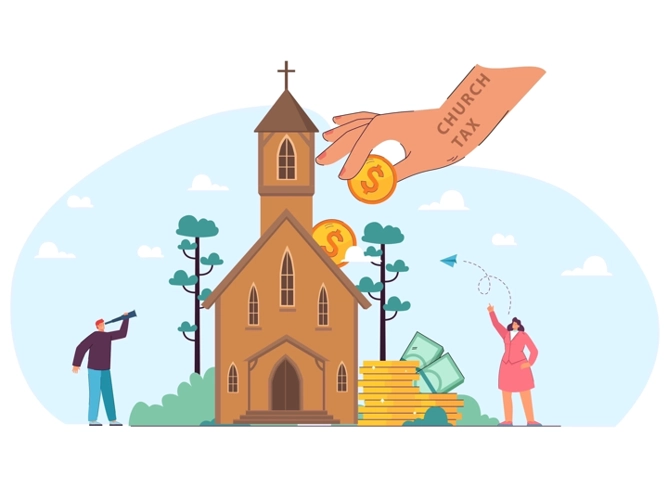
Church Tax in Germany – Kirchensteuer [2025 English Guide]
Since 1919, Germans are paying the Church Tax. From outside, it might seems that Germans are not that religious but in reality In Germany, almost half of the population is either protestant or catholic. That’s why residents of Germany are encouraged to contribute. Germany has almost all the religions but only Catholics, Protestants, and Jews are subject to the church tax (Kirchensteuer). The amount is determined by the person’s income and the state in which he or she lives. Your income tax is divided equally between Bavaria and Baden-Wurttemberg, with the other states receiving 9% each. The Protestant churches received 6.63 billion euros from church tax as of the 2021 record on Statista.
What Is Church Tax (Kirchensteuer)?
Members of certain religious congregations in Germany are subjected to the church tax (Kirchensteuer in German). Taxes may be collected from members of the Protestant, Catholic, and Jewish faiths in Germany. German tax authorities collect the tax and transfer it to the appropriate religions.
When newcomers to Germany are subjected to church tax (Kirchensteuer) without realizing it, they are often surprised.
In summary, members of Protestant, Catholic, and Jewish faiths have the right to levy a church tax on one another, which is subtracted automatically from your monthly income if you have indicated that you are a member.
Who Has To Pay The German Church Tax (Kirchensteuer)?
The German church tax is owed by anybody who is a member of a religion that collects taxes in general. That’s simple enough to determine for Germans who have been baptized, but it gets more complicated for expats.
Registering with your local citizens’ office to get your registration certificate is one of the first things you’ll want to do when you arrive in Germany. You are questioned about your religion in the Anmeldung form. You may indicate your religious affiliation here using one of the following abbreviations if you belong to a religious community:
- ev – Evangelical
- rf – Reformed
- rk – Roman Catholic
- is – Jewish
How Much Is The Church Tax In Germany?
The German tax office (Finanzamt) is responsible to collect the church tax on behalf of the religious organizations The Finanzamt will withhold an extra 8–9% of your income tax. You can also see that in your German salary slip. After that, your church contribution will be transferred to the religion which you select when you were doing your city registration, depending on where you reside in Germany.
Let’s assume that you have a gross income of 50,000 euros, resulting in an annual tax liability of 20%, or 10,000 euros. On top of this 10,000 euros, you’ll pay around 800-900 euros in church tax because the church tax (8-9%) is added on top.
This number grows over time, and you’ll most likely pay a substantial sum of money in Kirchensteuer each year. You may claim this sum as a “special expense” on your yearly tax return to lower your taxable income if you pay church tax.
How to Enter Church Tax On Tax Declaration?
You may write special expenses (Sonderausgaben) on your tax return if you have paid both church tax and local/special church tax. In this category, you can declare both your Prepaid and postpaid church taxes. Your income tax is reduced, and the church tax is calculated from it, by declaring and deducting these taxes from your income.
You can deduct this, just as you would church taxes if your church has the option to collect taxes but declines to do so. 8% or 9% is the typical church levy rate.
You may claim this as a donation on the Special Expenses Form (Anlage Sonderausgaben) of your tax return if you have paid money to churches that has nothing to do with the church tax.
Why Does Church Tax Exist?
The church tax system, which is rooted in the pre-Christian Germanic tradition, holds that the leader of a tribe was directly responsible for the upkeep of the relevant religious group. It has been in place since the nineteenth century.
The idea of community ruler maintenance remained the conventional practice in most Western European nations, and this tradition was eventually adopted by Christian faiths.
Local rulers in Germany took on the responsibility of church upkeep during the Reformation period. The finances of churches, on the other hand, were heavily controlled by the state in the nineteenth century, to the point that they became financially self-sufficient.
The church tax took the place of the state benefits that churches had previously received at this time.
How Is This Tax Collected?
This, like the rest of your income tax in Germany, is taken directly from your paycheque. This is what it means when you get a payslip with the letter “KS” (Kirchensteuer).
For self-employed people, the process appears to be a little different, although it is. It will be deducted from your income tax payment. This might happen in yearly, monthly, or quarterly installments depending on your situation. The information has already been provided to the Finanzamt, so no additional papers are required.
What If I’m Not A Religious Person
You can indicate this by entering “oa” (which translates to “keiner öffentlich-rechtlichen Religionsgesellschaft angehörig”) or just a dash through the box and opt out – at least, in theory. If you are not religious (or don’t want to pay the tax), you may do so by writing “oa” in the field or simply putting a dash through it.
Some individuals have reported being asked for hundreds of euros in back payments after ticking “not religious” on their registration forms.
If you were baptized in your home nation or attended services on a regular basis, you may find yourself found out and sued with a hefty fine if churches in Germany contacted churches abroad for information on their members. You may be required to pay the church tax if you’ve ever been religious.
How to use Church facilities if you don’t pay church tax?
You will also need to register and pay church tax if you want to join a Catholic, Protestant, or Jewish community or use their facilities to get married, baptize a kid, or have a Christian burial.
What Is The Process Of Leaving The Church In Germany And Stopping Paying Taxes?
There is a way to leave and get out of paying the church tax if you’ve unwittingly joined the church in Germany – but it may take time and be exceedingly bureaucratic. The Kirchenaustritt (leaving the church) is the term used for this procedure.
How Much Does It Cost to renounce Church Membership?
It costs roughly 30 euros to renounce your church membership, however, the specifics vary depending on where you live. With your registration certificate and some form of identification, you’ll have to apply to your local administrative court (Amtsgericht) or registry office (Standesamt).
You’ll need your marriage certificate if you’re married. You can query who your local government is on the website Kirchenaustritt.de (in German), as well as get some useful tips during the process.
What Is An Austrittsbescheinigung?
You will get an Austrittsbescheinigung (exit certificate) after you have successfully completed the necessary steps, demonstrating that you are no longer a member of the church. While there may be a wait of a few months, your church tax payments should automatically stop.

Jibran Shahid
Hi, I am Jibran, your fellow expat living in Germany since 2014. With over 10 years of personal and professional experience navigating life as a foreigner, I am dedicated to providing well-researched and practical guides to help you settle and thrive in Germany. Whether you are looking for advice on bureaucracy, accommodation, jobs, or cultural integration, I have got you covered with tips and insights tailored specifically for expats. Join me on my journey as I share valuable information to make your life in Germany easier and more enjoyable.





